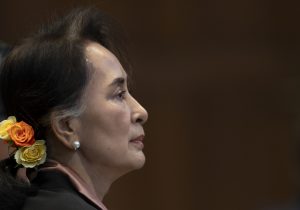A court in military-ruled Myanmar convicted the country’s ousted leader Aung San Suu Kyi on two more corruption charges Wednesday, with two three-year sentences to be served concurrently, adding to previous convictions that now leave her with a 26-year total prison term, a legal official said.
Aung San Suu Kyi, 77, was detained on February 1, 2021, when the military seized power from her elected government. She has denied the allegations against her in this case, in which she was accused of receiving $550,000 as a bribe from a tycoon convicted of drug trafficking.
Corruption cases comprise the biggest share of the many charges the military has brought against the 1991 Nobel Peace laureate. Aung San Suu Kyi has been charged with 12 counts in total under the anti-corruption act, with each count punishable by up to 15 years in prison and a fine.
She had already been sentenced to 23 years’ imprisonment after being convicted of illegally importing and possessing walkie-talkies, violating coronavirus restrictions, breaching the country’s official secrets act, sedition, election fraud, and five corruption charges.
Her supporters and independent analysts say the charges are politically motivated and an attempt to discredit her and legitimize the military’s seizure of power while keeping her from taking part in the next election, which the military has promised in 2023.
In recent months, her trials have been held in a purpose-built courtroom in the main prison on the outskirts of the capital, Naypyidaw. Aung San Suu Kyi has not been seen or allowed to speak in public since she was arrested. Her lawyers, who had been a source of information on the proceedings, have not been allowed to speak publicly on her behalf or about her trial since a gag order was placed on them last year.
In the case decided Wednesday, Aung San Suu Kyi was accused of receiving a total of $550,000 in 2019 and 2020 from Maung Weik, with separate payments being treated as two offenses.
Maung Weik, a construction magnate, had a close relationship with the army generals in power during a previous military-run government, and has headed two main companies during three decades in business: Maung Weik & Family Co. Ltd., specializing in the trading of metals and agricultural products, and Sae Paing Development Ltd., a real estate and construction company.
He was sentenced to 15 years in prison in 2008 for trafficking drugs but was released in 2014 under a semi-democratic transitional government led by former General Thein Sein.
After his release from prison, Maung Weik returned to doing business with former generals and according to a 2017 report in The Irrawaddy, an online news magazine, became chairman of Mandalay Business Capital City Development, which was involved in urban development work.
Under Aung San Suu Kyi’s government, Maung Weik won a major development project that included the construction of houses, restaurants, hospitals, economic zones, a port, and hotel zones in Myanmar’s central Mandalay region.
He was reportedly interrogated by the army two weeks after its takeover, and shortly after that, in March 2021, military-controlled state television broadcast a video in which he claimed to have given cash payoffs to government ministers to help his businesses.
He said in his video that the money included $100,000 provided to Aung San Suu Kyi in 2018 for a charitable foundation named after her mother, and another $450,000 in payments in 2019 and 2020 for purposes he did not specify.
A state-controlled newspaper, the Global New Light of Myanmar, reported in February that Aung San Suu Kyi in her position as state counselor — the country’s de facto chief executive — received $550,000 in four installments in 2019-2020 “to facilitate the business activities of a private entrepreneur.”
Aung San Suu Kyi’s close colleague, Zaw Myint Maung, who served as a chief minister in the Mandalay region, was separately accused of receiving more than $180,000 from Maung Weik and was convicted of corruption in June.
Wednesday’s verdict sentencing Aung San Suu Kyi to two three-year sentences to be served concurrently was conveyed by a legal official who insisted on anonymity for fear of being punished by the authorities.
He added that her lawyers are expected to file an appeal in the coming days.
In separate proceedings, Aung San Suu Kyi is still being tried together with the country’s former president, Win Myint, on another five corruption charges in connection with permits granted to a Cabinet minister for the rental and purchase of a helicopter.
Aung San Suu Kyi has been the face of the opposition to military rule in Myanmar for more than three decades. The previous military government put her under house arrest in 1989, which continued on-and-off for 15 of the next 22 years.
Her National League for Democracy party initially came to power after winning the 2015 general election, ushering in a true civilian government for the first time since a 1962 military coup. However, democratic reforms were small and slow in coming, largely because the military retained substantial power and influence under the terms of a constitution it had enacted in 2008.
The National League for Democracy won a landslide victory again in the 2020 election, but its lawmakers were kept from taking their seats in Parliament by the army, which also arrested the party’s top leaders.
The army said it acted because there had been massive voting fraud in the 2020 election, but independent election observers did not find any major irregularities.
The 2021 takeover was met by nationwide peaceful protests that security forces quashed with deadly force, triggering fierce armed resistance that some U.N. experts now characterize as civil war.
According to a detailed list compiled by the Assistance Association for Political Prisoners, a watchdog group now based in Thailand, Myanmar security forces have killed at least 2,343 civilians and arrested 15,821.

































